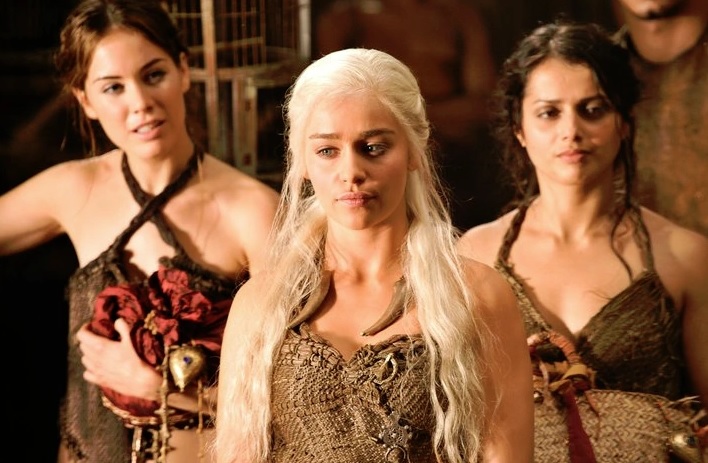Here at Watchers on the Wall, we don’t often report on the personal lives of the cast and crew of Game of Thrones — we like to respect their privacy and focus on the art they create. However, Emilia Clarke recently opened up about a life-threatening situation she faced not once, but twice during filming of the series, and how it affected her professional as well as personal life. Have some tissues handy, readers, because this story is an emotional rollercoaster.
In an essay for The New Yorker, Clarke reveals that in February of 2011 — at only 24 years old and having just wrapped filming on the first season of Thrones — she suffered a subarachnoid hemorrhage, a life-threatening type of stroke, caused by bleeding into the space surrounding the brain. She’d had an aneurysm that could only be relieved by emergency brain surgery. Doctors performed a three-hour-long procedure, inserting a wire into one of her femoral arteries and threading up through the body and into the brain, where it sealed off the aneurysm. Clarke spent a month in the hospital recovering from the surgery and its aftereffects, including a period of aphasia, a loss of the ability to speak and communicate — something that terrified her beyond belief.
“In my worst moments, I wanted to pull the plug,” she writes. “I asked the medical staff to let me die. My job — my entire dream of what my life would be — centered on language, on communication. Without that, I was lost.”
It was the first time — but not the last — that Clarke would be in the hospital for a life-threatening aneurysm. Doctors had discovered a smaller one on the other side of her brain and were monitoring its status. In 2013, she went for one of the regular brain scans prescribed by her doctors, and they found the other aneurysm had grown. They recommended another simple operation — except this one was derailed by complications.
Clarke writes that she woke up in agonizing pain, only to be told that there was a massive bleed inside her brain and they needed to perform a much more invasive surgery to avoid catastrophic consequences. So the doctors opened up her skull to operate.

Clarke in Season 2, which she says was the hardest season to film and participate in press for after her first aneurysm surgery.
The essay has a happy ending, of course — she writes that she’s now “at one hundred percent” — but it’s a story of raw emotion, of hope and despair and everything in between, written in Clarke’s own words and coming from her own heart. I don’t want pull too much more from this essay, because the story is hers alone to tell.
That said, in an accompanying interview from The New Yorker Radio Hour, Clarke talks a bit more about not just the surgeries themselves, but how they affected her experience in the early seasons of Thrones. She says she “didn’t want to cause any trouble” for the show, mostly because she was a young actor given a great job — and she didn’t want to lose it.
“I was a young girl who was given a huge opportunity,” she tells host David Remnick. “I did not, for any reason, want to give anyone a reason to think I was anything other than capable of fulfilling the duties they had given me. And I didn’t know what the show was at that moment. All I knew was I had a job.”
She also says that Season 2 was the worst for her, battling constant pain and fatigue even as the show was exploding in popularity across the world. She says she would often bring a “morphine bottle and a straw” to press events and photo shoots. HBO was enormously supportive, she says, arranging for photo shoots in which she “would just lie down” and making sure there was a separate area for her to rest. The interview is short, only about 17 minutes long, and it’s worth it to hear Emilia speak about the experience.
Needless to say, the essay and interview are hard to take in. But they’re a wonderful example of strength and resolve, and proof that Clarke, like her counterpart Daenerys, knows that the lessons of staying strong when faced with darkness and fear are lessons worth learning.




















![[Book Review] The Blade Itself (The First Law Trilogy) by Joe Abercrombie](https://bendthekneegot.com/wp-content/uploads/2018/01/1516047103_maxresdefault-218x150.jpg)



















